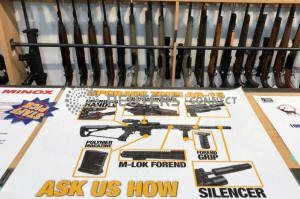|
New Zealand bans military type
semi-automatic weapons used in mosque massacre
 Send a link to a friend
Send a link to a friend
 [March 21, 2019]
By Tom Westbrook and Charlotte Greenfield [March 21, 2019]
By Tom Westbrook and Charlotte Greenfield
CHRISTCHURCH (Reuters) - New Zealand will
ban military-style semi-automatic and assault rifles under tough new gun
laws following the killing of 50 people in its worst mass shooting,
Prime Minister Jacinda Ardern said on Thursday.
In the immediate aftermath of last Friday's shootings at two mosques in
the city of Christchurch, Ardern labeled the attack as terrorism and
said New Zealand's gun laws would change.
"On 15 March our history changed forever. Now, our laws will too. We are
announcing action today on behalf of all New Zealanders to strengthen
our gun laws and make our country a safer place," Ardern told a news
conference.
ďAll semi-automatic weapons used during the terrorist attack on Friday
15 March will be banned."
Ardern said she expected the new laws to be in place by April 11 and a
buy-back scheme costing up to NZ$200 million ($138 million) would be
established for banned weapons.

All military style semi-automatics (MSSA) and assault rifles would be
banned, along with parts used to convert weapons into MSSAs and all
high-capacity magazines.
Under existing gun laws, a standard A-category gun license allows
semi-automatics limited to seven shots. Live-streamed video of a gunman
in one of the mosques showed a semi-automatic weapon modified with a
large magazine.
Australia banned semi-automatic weapons and launched a gun buy-back
after the Port Arthur massacre in 1996 in which 35 people were killed.
Ardern said that similar to Australia, the law would allow for strictly
enforced exemptions for farmers for pest control and animal welfare.
"I strongly believe that the vast majority of legitimate gun owners in
New Zealand will understand that these moves are in the national
interest, and will take these changes in their stride."
LOTS OF GUNS
New Zealand, a country of fewer than 5 million people, has an estimated
1.2-1.5 million firearms, about 13,500 of them MSSA-type weapons.
Most farmers own guns while hunting of deer, pigs and goats is popular.
Gun clubs and shooting ranges dot the country.
That has created a powerful lobby that has thwarted previous attempts to
tighten gun laws.
Federated Farmers, which represent thousands of farmers, said it
supported the new laws.
"This will not be popular among some of our members but ... we believe
this is the only practicable solution," a group spokesman, Miles
Anderson, said in a statement.
The main opposition National Party, which draws strong support in rural
areas, said it also supported the ban.
The changes exclude two general classes of firearms commonly used for
hunting, pest control and stock management on farms.
"I have a military style weapon. But to be fair, I don't really use it,
I don't really need it," said Noel Womersley, who slaughters cattle for
small farmers around Christchurch.
"So I'm quite happy to hand mine over."
Ardern said more reforms would cover the firearm registry and licensing.
[to top of second column]
|

A view of Gun City gunshop in Christchurch, New Zealand, March 19,
2019. REUTERS/Jorge Silva/Files

MOSQUES TO REOPEN FOR FRIDAY PRAYERS
Nada Tawfeek, who buried her father-in-law killed in the attacks,
Hussein Moustafa, on Thursday, welcomed the ban.
"It's a great reaction. I think other countries need to learn from
her," Tawfeek said.
Mohammed Faqih, a member of the Islamic clergy who flew in from
California and attended the funerals for some victims on Thursday,
said he was "extremely grateful" for the gun ban.
"I wish our leaders in the States would follow on her footsteps and
do the same thing," he said.
The first victims were buried on Wednesday and burials continued on
Thursday, with the funeral of a school boy.
A mass burial is expected on Friday.
The bullet-riddled Al Noor mosque was being repaired, painted and
cleaned ahead of Friday prayers.
Ardern will attend the Muslim call to prayer and a two-minute
silence at Hagley Park, opposite the mosque. The call to prayer will
be telecast nationally.
Armed police have been guarding mosques around New Zealand since the
attacks. Police said there would be a "heightened presence" on
Friday to reassure those attending weekly prayers.
Thousands of worshippers are expected at the Al Noor mosque, where
the majority of victims died.
Most victims were migrants or refugees from countries such as
Pakistan, India, Malaysia, Indonesia, Turkey, Somalia, Afghanistan
and Bangladesh.
Australian Brenton Tarrant, 28, a suspected white supremacist who
was living in Dunedin, on New Zealand's South Island, has been
charged with murder following the attack.
He was remanded without a plea and is due back in court on April 5,
when police said he was likely to face more charges.

Twenty-eight people wounded in the attacks remain in hospital, six
in intensive care.
As darkness fell, about 100 people gathered in a Christchurch square
for an inter-faith vigil. Christian leaders led hymns and people
laid ferns as a symbol of peace.
"Whatever you believe, whatever I believe, we're still human beings.
We still need each other," Ibrahim Abdelhalim, imam of Linwood
Mosque, where seven people were killed, told the crowd.
(Reporting by Tom Westbrook, Charlotte Greenfield, Joseph Campbell
in CHRISTCHURCH, Praveen Menon in WELLINGTON.; Editing by Michael
Perry and Lincoln Feast)
[© 2019 Thomson Reuters. All rights
reserved.]
Copyright 2019 Reuters. All rights reserved. This material may not be published,
broadcast, rewritten or redistributed.
Thompson Reuters is solely responsible for this content. |